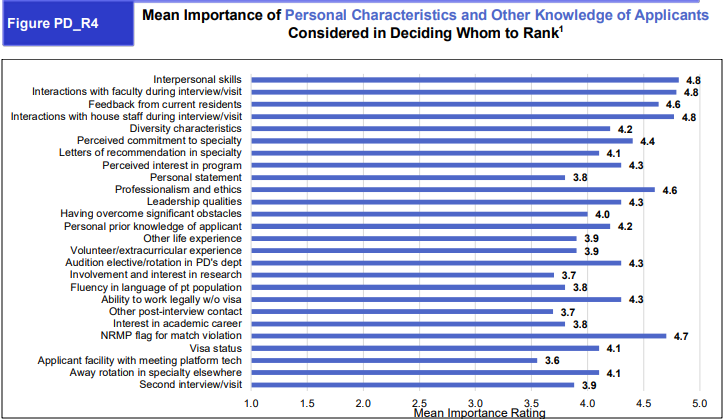How should you prepare for residency interviews?
Before you begin reading through this list, a fair word of advice. Neither this list, nor any other list on the internet, will prepare you for every single interview question you might receive. The top questions on this list however, are almost guaranteed to appear at some point along the residency interview trail. Reading through them, and thinking about what your response might be, is well worth the time and effort before you enter your first interview. Our recommendation is to not only think of your answer, but practice saying it out loud in order to gain experience with expressing your thoughts into the actual words you would vocalize in front of an interviewer. Often times, the first few rounds of this exercise will reveal that the words and sentences you come up with may not be exactly what you had hoped or planned, and will need fine-tuning before showing up on interview day.
While this will help for the most common questions below, there will undoubtedly be questions that you are presented with during interview season that you have not practiced. That is ok, and everyone will have that experience. The keys to remember when you come across a question you have not heard before is that the most important parts of answering a question successfully is to take your time, be honest with your answer, and show your genuine self. Silly or unexpected questions like ‘If you could be any tool in the toolshed, which would you be?’, or ‘if you could bring one book with you on an island, which would it be?’, are not meant to have a right or wrong answer. Instead, they’re meant to reveal something about your preferences and personality, and the best way to answer them is what genuinely comes to mind and explaining why they mean something to you. That being said, the below residency interview questions may still likely come up at some point during interview season, and for the most common ones it is certainly still worth practicing them to ensure that you answers are clear, concise, and get to the heart of the desired answer.
How important is the residency interview?
Once you have gotten the interview invitation – several things become clear. You have passed the programs initial screen, and are within range of their USMLE exam acceptance range. In addition, your letters of recommendation, personal statement, and all other application components on paper have been at or above their level of expectation and you have the credentials to gain acceptance. The interview is the next phase that determines whether you will ultimately match at that program, and seeks to explore a different kind of metric on you as an applicant. Programs are looking for applicants that will contribute positively to a program’s culture, are going to work well with their colleagues, and can bring a unique perspective to the overall cohort of residents. Namely, they want to make sure you are someone who will get along well with others in your class, that you are a ‘team player’, and that do not have any red flags that will impact your training or the schools reputation going forward.
So how important is the interview to schools? It turns out, very important. In a survey of over 1,000 residency programs across the United States, the interview was ranked as the second most important component of the applicant when deciding on ranking for the match, right behind interpersonal skills. Below is a table summarizing the findings from this study, with the original paper link here. If you want to properly prepare for an interview, get expert help and check out our offer of medicine interview preparation.

What are the most common questions that I should be prepared for during my residency interviews?

- Tell me a little bit about yourself.
- What are you most proud of?
- Can you share a time where you have overcome something difficult?
- Tell me about a patient encounter that has stood out to you.
- Where do you see your career 5 or 10 years after residency?
- What has drawn you to this specialty?
- Where do you want to make the biggest impact in the future?
- What has been the experience that has most impacted you?
- Which research experience are you proud of?
- What areas of research interest you going forward?
- What do you feel is your greatest weakness?
- Can you tell me about a negative encounter you’ve had with a colleague?
- Have you ever had a difficult experience with a patient or family?
- What do you like to do for fun?
- What do you think you would bring to the diversity of thought and innovation at our program?
- What would your friends and family say about you if they were here?
- What made you interested in our residency program?
- Do you have any concerns or fears about pursuing this specialty?
- What skills do you hope to gain in our program?
- Do you have any ties to this area?
- Tell me about a time you wish you had handled a situation differently.
- What do you think are the most difficult parts of our specialty?
- What has been the most challenging experience for you thus far?
- What could you uniquely contribute to our institution?
- What gaps do you believe exist in the current medical system, and how would you go about addressing them?
- Are you interested in pursuing fellowship?
- Have you been considering other specialties for residency applications?
- What traits do you have that you feel make you a great fit for our field?
- Tell me about a time where things did not go according to plan in one of your projects or experiences.
- Tell me about a time where you feel you truly made in impact in someone else’s life.
- What experiences have you had working with diverse populations, and how has that informed your perspective on medicine?
- Has there been an instance where you have had to ask for help? What was it?
- Tell me about a time where you displayed leadership and hade to make a difficult decision.
- Tell me about this club/organization you started or contributed to.
- Which clinical experience was most meaningful to you and why?
- What have been your greatest inspirations or role models?
- Tell me about a time you stood up for something even though it may not have been the popular or easy choice.
- What are you passionate about outside of medicine?
- What has been your favorite extracurricular activity and why?
- What do you do to relax?
- What does your typical schedule look like on a daily basis?
- Is there anything you are hoping to do in the next year in terms of projects or learning goals?
- Do you know any other languages? If so, how do you think this could be useful in the future?
- What are you most concerned about in the world right now on a global scale?
- Are there any gaps or academic challenges that you think you need to address?
- How have your personal and family experiences influenced your work as a future physician?
- What would you do if you did not go into this specialty this cycle?
- Why do you wish to attend our program specifically, over so many other excellent programs?
- What programs would you wish to start or join if you were to attend our program?
- Is there anything else that I should know about you?

Frequently asked questions
Absolutely. You should have multiple people review your essays for grammar and spelling errors, transition quality, and overall message. The most polished essays that are application-ready have usually been through at least 2 or 3 revisions prior to submission.
The most common format for residency interviews is one-on-one or panel interviews (two or more interviewers with one applicant). MMI interviews are being employed more in medical school interviews, though it is still possible to encounter this in a few residency programs.
During interview season, you may have many interviews and it will be difficult to remember everything that occurred during each day and your impressions when comparing programs prior to ranking for the match. For this reason, you should take a few minutes to write down your impressions directly after interview day for each program.
Anywhere between 1.5 to 3 minutes is a safe range for answers, although a few seconds more or less than this is completely reasonable depending on the question. The quality of the answer, given concisely and directly, is far more important than the amount of minutes you are speaking. That being said, avoid rambling for overly long periods of time.
Thank you letters may not make a difference in ranking at a program, however they are a thoughtful and nice touch. The exception to this is if a program specifically states not to send thank you’s – then you should respect their request. For letters of intent, it is appropriate to choose one program if it is your clear number one choice and send an email to the program director letting them know. Do not choose more than one program to send this letter to – it is first and foremost dishonest to do so, and medicine is a small world and it is not advisable to burn bridges.
